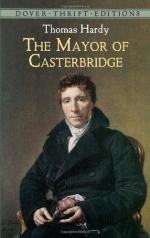Then, before she could collect her thoughts, Henchard went out from her rooms, and departed from the house by the back way as he had come; and she saw him no more.
45.
It was about a month after the day which closed as in the last chapter. Elizabeth-Jane had grown accustomed to the novelty of her situation, and the only difference between Donald’s movements now and formerly was that he hastened indoors rather more quickly after business hours than he had been in the habit of doing for some time.
Newson had stayed in Casterbridge three days after the wedding party (whose gaiety, as might have been surmised, was of his making rather than of the married couple’s), and was stared at and honoured as became the returned Crusoe of the hour. But whether or not because Casterbridge was difficult to excite by dramatic returns and disappearances through having been for centuries an assize town, in which sensational exits from the world, antipodean absences, and such like, were half-yearly occurrences, the inhabitants did not altogether lose their equanimity on his account. On the fourth morning he was discovered disconsolately climbing a hill, in his craving to get a glimpse of the sea from somewhere or other. The contiguity of salt water proved to be such a necessity of his existence that he preferred Budmouth as a place of residence, notwithstanding the society of his daughter in the other town. Thither he went, and settled in lodgings in a green-shuttered cottage which had a bow-window, jutting out sufficiently to afford glimpses of a vertical strip of blue sea to any one opening the sash, and leaning forward far enough to look through a narrow lane of tall intervening houses.
Elizabeth-Jane was standing in the middle of her upstairs parlour, critically surveying some re-arrangement of articles with her head to one side, when the housemaid came in with the announcement, “Oh, please ma’am, we know now how that bird-cage came there.”
In exploring her new domain during the first week of residence, gazing with critical satisfaction on this cheerful room and that, penetrating cautiously into dark cellars, sallying forth with gingerly tread to the garden, now leaf-strewn by autumn winds, and thus, like a wise field-marshal, estimating the capabilities of the site whereon she was about to open her housekeeping campaign—Mrs. Donald Farfrae had discovered in a screened corner a new bird-cage, shrouded in newspaper, and at the bottom of the cage a little ball of feathers—the dead body of a goldfinch. Nobody could tell her how the bird and cage had come there, though that the poor little songster had been starved to death was evident. The sadness of the incident had made an impression on her. She had not been able to forget it for days, despite Farfrae’s tender banter; and now when the matter had been nearly forgotten it was again revived.
“Oh, please ma’am, we know how the bird-cage came there. That farmer’s man who called on the evening of the wedding—he was seen wi’ it in his hand as he came up the street; and ’tis thoughted that he put it down while he came in with his message, and then went away forgetting where he had left it.”




